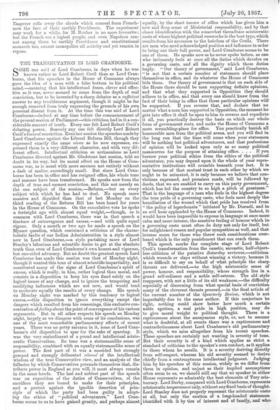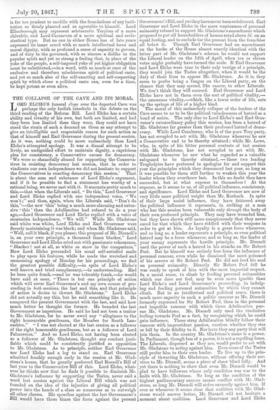THE TRANSMUTATION IN LORD CRANBORNE.
SOME one said of Lord Cranborne, in days when he was known rather as Lord Robert Cecil than as Lord Oran- borne, that his speeches in the House of Commons always gave the idea of a man with a false bottom to his political mind,—meaning that his intellectual fence, clever and effec- tive as it was, never seemed to come from the depth of real conviction, but to be invented by a sharp debater as a sufficient answer to any troublesome argument, though it might be far enough removed from truly expressing the grounds of his own personal dissent from it. At the time this was said of Lord Cranborne—indeed at any time before the commencement of the present session of Parliament—this criticism had in it a con- siderable amount of truth. Every one felt Lord Robert Cecil's debating power. Scarcely any one felt directly Lord Robert Cecil's force of conviction. Even last session the speeches made by Lord Cranborne against the Liberal Reform Bill, though they expressed exactly the same views as he now expresses, ex- pressed them in a very different character, and with very dif- ferent effect. Intellectual criticism so acrimonious as Lord Cranborne directed against Mr. Gladstone last session, told no doubt in its way, but its moral effect on the House of Com- mons was, as is usual with mere sarcasm not entirely without a dash of malice, exceedingly small. But since Lord Oran- borne has been in office and has resigned office, his whole tone and manner have been transformed. He speaks now from the depth of true and earnest conviction, and this not merely on the one subject of the session,—Reform,—but on every subject with which he has had to deal. No speech more massive and dignified than that of last Monday on the third reading of the Reform Bill has been heard for years in the House of Commons. On the cumulative vote he spoke a fortnight ago with almost equal weight,—though, as is common with Lord Cranborne, there was in that speech a tincture of extravagance and excess,--and with quite equal vigour. Only a month or two ago he made a speech on the Mysore question, which contained a criticism of the charac- teristic faults of our Indian Administration in a style almost new in Lord Cranborne,—a style partaking more of Lord Stanley's laborious and scientific desire to get at the absolute truth than even of Lord Cranbome's own honest and vigorous, but one-sided advocacy. But no doubt the greatest speech Lord Cranborne has made this session was that of Monday night, though it wanted this tone of almost scientific impartiality, and manifested many of the signs of Lord Cranbome's spirit of excess, which is really, in him, rather logical than moral, and consists in a disposition to keep his eyes fixed solely on the logical issues of any change, and to ignore the tempering and modifying influences which are not new, and would tend to moderate equally the results of every change. His speech on Monday night was marked by this tendency to logical excess,—this disposition to ignore everything except the dangers which resulted from his reasonings, this exclusive con- centration of feeling about the point of convergence of his various arguments. But in all other respects his speech on Monday night, largely as we disagree with some of its conclusions, was one of the most remarkable parliamentary efforts of recent years. There was no petty sarcasm in it, none of Lord Oran- borne's old disposition to spar for the sake of sparring. It was the very embodiment of a proud and intellectual aristo- cratic Conservatism. Its tone was a statesmanlike sense of responsibility, combined with an equally statesmanlike sense of power. The first part of it was a onesided but strongly grasped and strongly delineated résumé of the intellectual wisdom of the true Conservative view, and an analysis of the fallacies by which Conservatives persuade themselves that, dis- tribute power in England as you will, it must always remain in the same hands. The last and noblest part of the speech was an exposition of the duties of Conservatives, of the sacrifices they are bound to make for their principles, and a protest against the ignoble desertion of prin- ciple of which the party had been guilty in adopt- ing the ethics of "political adventurers." Lord Cran- borne seems to us to have gained greatly, and perhaps almost equally, by the short tenure of office which has given him a. new and deep sense of Ministerial responsibility, and by that closer identification with the somewhat threadbare aristocratic caste of whose highest political essencehe is the best type, which results from his accession to the heirdom of the Cecils. There are men who need acknowledged position and influence in order to bring out their full power, and Lord Cranborne seems to be one of them. He speaks now as he never spoke before, as one who intimately feels at once all the duties which devolve on a governing caste, and all the dignity which those duties imply. "Our theory of govenunent," said Lord Cranborne, "is not that a certain number of statesmen should place. themselves in office, and do whatever the House of Commons. bids them. Our theory of government is that on each side of the House there should be men supporting definite opinions,. and that what they supported in Opposition they should adhere to in office, and that every one should know from the fact of their being in office that these particular opinions will` be supported. If you reverse that, and declare that no matter what a man has supported in Opposition, the moment he gets into office it shall be open to him to reverse and repudiate- it all, you practically destroy the basis on which our whole. form of government rests, and make the House of Commons a mere scrambling-place for office. You practically banish all honourable men from the political arena, and you will find in- the long run that the time will come when your statesmen will be nothing but political adventurers, and that professions of opinion will be looked upon only as so many political manceuvres for the purpose of attaining office. . . . If you borrow your political ethics from the ethics of the political adventurer, you may depend upon it the whole of your repre- sentative institutions will crumble beneath your feet. It is, only because of that mutual trust in each other by which we- ought to be animated, it is only beoause we believe that con- victions expressed, and promises made, will be followed by deeds, that we are enabled to carry on this party government, which has led the country to so high a pitch of greatness." That is the language of a man who feels in the highest degree- the true pride of a governing caste, who feels most deeply the- humiliation of the wound which that pride has received from "the policy of legerdemain" initiated by Mr. Disraeli, and in an evil hour applauded by the House of Commons. Indeed, it would have been impossible to express in language at once more. calm and more intense, the sensitive feeling of honour which in, a governing caste must often do duty not only for itself, but for enlightened reason and popular sympathies as well, and that intense scorn for those who throw such considerations over- board which is the only punishment that can reach them.
This speech marks the complete stage of Lord Robert Cecil's transformation from the caustic, sarcastic, half-object-- less criticism of the putative Saturday reviewer,--criticism which wounds or slays without winning a victory, because it is so difficult to say on behalf of what principle the sharps thrusts are delivered,—to the high aristocratic sense of power, honour, and responsibility, whose strength lies in a, grand self-reliance and a noble self-esteem. The old style- reappears, with not a little of its old weakness,—the difficulty especially of discerning from what special basis of convictiomi many of the cleverest thrusts proceed,—in the final article of the current number of the Quarterly Review, which is nob- improbably due to the same author. If this conjecture be- right, nothing could show better how much a certain noble egotism, a real pride in high position, may do- to give moral weight to political thought. There is a captiousness about the anonymous style, or, not to assume what is doubtful, at all events there was a captiousness and. contradictiousness about Lord Cranborne's old parliamentary style, which we miss altogether from his recent speeches.. These speeches are certainly not wanting in severity of tone. But their severity is of a kind which applies as strict a standard of criticism to the speaker's own conduct, as it applies to those whom he assails. It is a severity deriving directly from self-respect, whereas his old severity seemed to derive- chiefly from a contemptuous intellectual judgment. Judging him by his speeches of this session, widely as we differ from them in opinion, and unjust as their implied assumptions often seem to us, we should still say that no speaker in either House represents so admirably the best elements of Tory aris- tocracy. Lord Derby, compared with Lord Cranborne, represents aristocratic temperament only, without any fixed basis of thought. Lord Stanley does not properly represent the aristocratic caste. at all, but only the caution of a long-headed statesman identified with it by ties of interest and of family, and who is far too prudent to meddle with the foundations of any insti- tution so firmly planted and so agreeable to himself. Lord Ellenborough may represent aristocratic Toryism of a more chivalric, and Lord Carnarvon of a more spiritual and eccle- siastical type. But no one in either House has of late years expressed its inner creed with so much intellectual force and moral dignity, with so profound a sense of capacity to govern, and of duty to the governed, with so sincere a dislike to the popular spirit and yet so strong a feeling that, in place of the yoke of the people, a self-imposed yoke of yet higher obligation must be substitnted,—in a word, with so much at once of the exclusive and therefore mischievous spirit of political caste, and yet so much also of the self-exacting and self-respecting spirit by which alone a political caste can, even for a time, be kept potent or even alive.































 Previous page
Previous page